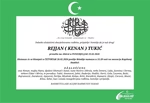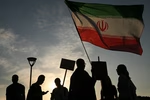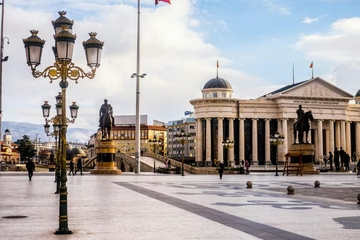
The current situation in the region is burdened with constant tensions and attempts of reincarnation of old great-power ideas, which requires a review of overall relations, the participants of the regular session of Association of Independent Intellectuals 'Krug 99' agreed on Sunday.
They discussed the 'Civic-political order and stability of Bosnia and Herzegovina', with Podgorica University professor Zivko Andrijasevic and Tuzla University's former rector Enver Halilovic as keynote speakers.
Elaborating on numerous issues that shape the contemporary reality in Bosnia and Herzegovina and Montenegro, the speakers offered a perspective of civic political organisation, which in no way excludes ethnic political representation, but offers the overcoming of old patterns of action, peace, stability and economic prosperity, based on a modern understanding of the state and its institutions.
Commenting on the current situation in Montenegro, Andrijasevic warned that there is a sort of comeback of the ideas of the past, "which happened as a majority political decision in the elections of August 30, 2020."
“After what happened in Montenegro following the elections, we are witnessing not the destruction or the denial of the political system, but the negation and suppression of a system of values that are permanent and had the prospect of being permanent,” said Andrijasevic.
Analysing the social foundations that give strength to new-old ideas in Montenegro, the professor noted that it had happened that one, formally non-political institution as the Church should be, became the leading institution of modern Montenegro, which is a kind of curiosity, but at the same time, “is a state of affairs that must undoubtedly change.”
“We have entered a process, not only political, but also ideological and social recompositions and we are now looking as a society for a model for how to respond to what the Montenegrin reality is,” he stressed, expressing confidence that the civil part of Montenegro will give an answer to the current situation with the advocacy of modernist and emancipatory ideas.
In his review of the situation in BiH, professor Halilovic reminded of the limitations of the Dayton system, i.e. its ethnic structure, which causes the permanent blockade of Bosnia's institutions and puts all its citizens in a difficult position.
He pointed out that the situation in BiH is further complicated by other social, regional and political circumstances, and that this culminated in the current situation, characterised by a constant political crisis, production of fear, sowing discord and strengthening of separatist tendencies.
“Now is the time to change the conflicting ethnonational political system into a harmonious civic system, such as the system inherited by most countries in the world today,” said the professor, stating that political Belgrade and Zagreb insist on the ethnic-national political system of BiH. in accordance with their “hegemonic ideas and practices.”
He warned that "with international assistance in Bosnia and Herzegovina, the civic political system on which the modern democratic world is based has been effectively disabled.”
“Ethno-nationalism, political and security insecurity are stimulated and provoked, which 'expels' young people from BiH and prevents overall economic progress and growth of living standards for BiH citizens,” Halilovic stressed, adding that such situation is unacceptable in BiH which has been for centuries known as a multi-ethnic country with the longest continuity in the region.
“The solution lies in establishing a new civic political system in BiH that will change the existing conflict into a harmonious, equal and socially acceptable status for all its citizens,” he concluded.
Kakvo je tvoje mišljenje o ovome?
Učestvuj u diskusiji ili pročitaj komentare





 Srbija
Srbija
 Hrvatska
Hrvatska
 Slovenija
Slovenija



























































